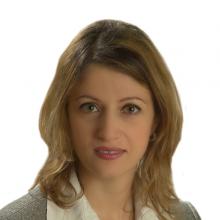
Women in Energy: Reem Hamdan
Every month we feature a women in energy that has shown exemplary leadership. We want to showcase her story and what she has done to get to where she is today. These women come from diverse backgrounds and roles; they bring with them a unique perspective to gender equality within the energy sector.

Reem Hamdan
Director General Deputy & Assistant in Regulation & Planning
Electricity Distribution Company (EDCO) - Jordan
Eng. Reem Hamdan has 23 years of experience in the electricity sector in Jordan, 17 of which have been with the Electricity Distribution Company (EDCO). Her experience has focused on electricity distribution planning, performance standards, energy efficiency, renewable energy, licensing, and regulation. Eng. Reem was appointed Deputy Director General in July 2015. For the previous six years, Hamdan served as the Director General Assistant for Regulation and Planning at EDCO. She has been a member of the Planning Committee in the Arab Union of Electricity (AUE) since 2004.
Eng. Reem holds a degree in Electrical Engineering from the University of Jordan. She has received several certificates from international committees for her participation in workshops and seminars, and received an award for best applied research at the 15th GCC CIGRE (International Conference on Large Electric Systems) Seminar for the paper “Privatization Impact on Distribution Activity in Jordan.”
Ms. Hamdan is a participant in the USEA managed Engendering Utilities Partnership. The objective of the USAID funded Partnership is to assist the seven participating international utilities from Macedonia, Jordan, Georgia, Kenya, and Nigeria improve their gender policies and gender outcomes. These outcomes will assist a firm’s corporate image, improve branding opportunities, improve labor market outcomes and contribute to greater operational efficiencies and increased profits.
Interview
Question: How has your education and career path led you to where you are now?
Answer: I started my career as a trainee electrical engineer after graduation in February 1993 in EDCO. I was gradually promoted to head of the section in 2000, then Department Manager in 2004, Director General Assistant in 2008, and finally Director General Deputy in July 2015.
Question: Over your career, have you witnessed changes within your organization to promote more women into leadership positions?
Answer: Yes. When I started my career there were only a few women (countable on one hand), and none of them worked in the distribution section; they were all working in the transmission planning section. Of course, there were no women in leadership positions at that time, not even at a middle-management level. But over time women proved their efficiency and abilities, so the chance is now given to women. Nowadays in the company, despite the fact that women only form 6% of EDCO employees, there are three women working as Department Managers and about 10 section heads.
Question: Technology is pushing the traditional utility business model, from renewables, grid modernization and smart meters to data analytics. Utilities that view potentially disruptive threats as opportunities will remain relevant to their customers and can create new revenue streams. Data shows links between diversity, quality, and innovation. What is your organization doing to attract, retain, and promote more women into senior management positions to respond to the dramatic industry transformation?
Answer: Still there is nothing specific in the company to attract, retain or promote women in that field. The only advantage or difference than before is that the chance is now given to women more to prove their abilities.
Question: Are talented women within your organization making it to top leadership positions? Why/why not?
Answer: It’s a very hard and long path to reach the leadership positions in any company where men are dominant, and I think it's very, very hard to reach the top leadership position (general manager or board members). The reason for that is the assumption is that women don’t have the ability to deal with the customers or lead the employees in our distribution areas because they are mostly rural customers and remote from the center offices.
Question: Based on a report published by the Association of Chartered Certified Accountants and the Economic Social Research Council, “Research suggests that gender diversity facilitates better decision making, greater independence, better adherence to corporate governance, less insolvency, greater innovation and creativity, and less ‘group-think’ where members of similar backgrounds can tend to ignore alternative views or concerns, leading to flawed decision making.” What is your organization doing to bring more women onto the board?
Answer: There are no specific actions taken until now, except for the ones that are suggested by the project financed by the USEA to promote women in electricity distribution activity (engendering activity).
Question: Companies that embrace diversity outperform their competitors. What type of diversity programs does your organization have in place to mentor future women leaders? How does your organization measure and report gender diversity? Is the data publicly available?
Answer: As I mentioned earlier, the steps that we take now were initiated by the USAID/USEA project to improve gender policies and gender outcome through the followings interventions:
- Increase the number of female engineers and females in additional positions by increasing the number of applications from female engineers in remote districts
- Advertise about the encouraging work-atmosphere for women and to reach out to women in remote areas to engage their local knowledge and to increase women applicants
- Conduct “Bring Your Daughter to Work Day” 2016 at EDCO headquarters
- Develop a program of meetings for women in the organization involving management
- Improve the internship program by assessing postgraduate interns to determine participation by women and men, and assessing engineering student participation in unpaid internships required by their universities for graduation
- Increase the number of women employees in the call center
The company calculates the percentage of women among its total employees, and documents this figure in its annual report.
Question: What actions should the sector be focused on to accelerate change, increase diversity, and foster a better gender balance in the boardroom?
Answer: Give the woman a chance. And if the chance is not given by the normal ways or promotions, try to influence the government to assign a quota for women (e.g. that each boardroom must have at least one woman representative). I think this is the only way to do it.
